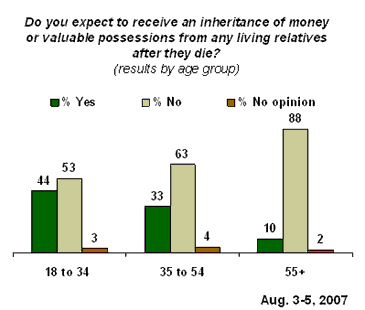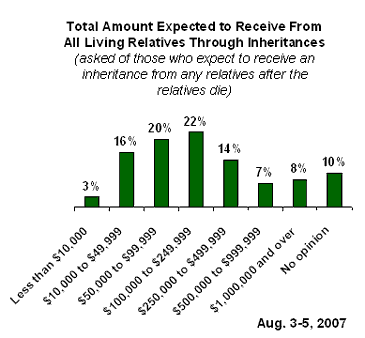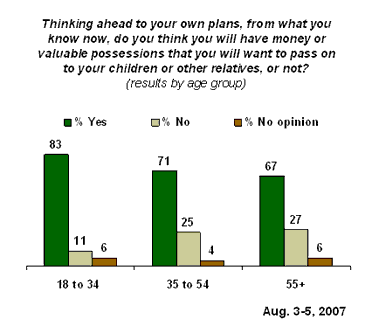GALLUP NEWS SERVICE
PRINCETON, NJ -- According to a recent USA Today/Gallup poll, most American adults don't expect to receive an inheritance, but the vast majority believe they will have money or valuable possessions that they will want to pass on to future generations. Among those who do expect to transfer wealth to heirs, the majority expect to leave the bulk of this as an inheritance after their death, but a substantial minority would like to distribute these assets while they are still alive.
Future Recipients
The poll, which was conducted Aug. 3-5, shows that fewer than 3 in 10 Americans (28%) expect to inherit either money or some valuable possessions from a relative, while 69% don't expect to inherit anything. Inheritance expectations appear to be greater among whites: Findings from the poll show that whites (30%) are more likely than nonwhites (19%) to expect a bequest.
Among all age groups, young respondents are the most likely to express inheritance expectations. Forty-four percent of American adults aged 18 to 34 expect their relatives to bequeath them money or other valuables, compared with 33% of 35- to 54-year-olds and only 10% of those 55 and older. Among the baby-boomer cohort (those born between 1946 and 1964), 25% expect to receive an inheritance.
The lower rates of expected inheritance among older individuals may be a result of their having already received a bequest from their parents and the low likelihood that they will receive another one. In fact, the poll shows that 36% of Americans aged 55 and older say they have already received an inheritance from a deceased relative. Also, boomers' parents may have less money to transfer to their children because of rising healthcare costs and increased life expectancy, which may explain why just one-quarter of boomers expect a windfall. However, growing up in relative material comfort, younger Americans may think that their parents, who are most likely boomers, have accumulated a certain level of wealth. This could explain why younger respondents have the greatest inheritance expectations of all age groups.

The poll also shows that the expectation of receiving an inheritance increases with income. Almost half of respondents (46%) whose household incomes are at least $75,000 say they expect to receive an inheritance, versus 13% of respondents whose household incomes are under $30,000.
The poll also reveals that those who think they will receive an inheritance are anticipating something more than a token. Thirty-nine percent of them expect the total value of the bequest to them to be under $100,000. A little less than one-quarter of respondents think they will receive between $100,000 and $249,999, and about 3 in 10 expect it will be more than that. That includes 14% of Americans who believe the amount will be between $250,000 and $499,999, and 15% who believe they will receive assets worth at least half a million dollars.

Future Benefactors
Looking to the future, most Americans think they will have wealth that they will be able to transfer to family members. Seventy-two percent of Americans believe they will have money or other valuable possessions to leave to their children or other relatives; just 22% of respondents don't expect to have anything to pass on. Men (77%) are more likely than women (67%) to believe they will have some wealth left to transfer.
Although majorities of Americans in all age groups think they will have some money or other valuable possessions to give, younger Americans are more optimistic about this. Eighty-three percent of respondents aged 18 to 34 think they will do so, versus 67% of respondents aged 55 and older. Most boomers also expect to have some wealth to bequeath, as 70% of respondents aged 43 to 61 believe they will pass on money or other valuables to family members.

Respondents with a college degree are more likely than those without one to expect to have some wealth to pass on to relatives; however, a majority of Americans, regardless of educational achievement, expect to be benefactors. Eighty percent of respondents with a college degree expect to have money or some other valuable possessions to give, as do two-thirds of respondents with a high-school education or less.
Two factors may explain why majorities of Americans, regardless of age or socioeconomic background, believe they will have some financial legacy to pass on. First, Americans may feel confident that, in spite of volatility in the stock market or current worries about home values, they will do well over the long run. Americans appear to believe they will have achieved a certain level of financial security and will have accumulated some wealth that can be transferred to children or relatives in the future. Second, Americans' anticipated generosity may simply reflect a desire to share their expected financial well-being with their loved ones.
To Give Now or Later
The poll also asked respondents how they intended to give any potential future wealth to their relatives. Fifty-seven percent of Americans who expect to have some money or other valuable possessions to pass on intend to leave most of it as an inheritance after their death. But 38% of respondents say they will distribute most of it while they are still alive. There is no significant difference between men's and women's responses to this question. While younger Americans who think they will have some wealth to leave are fairly evenly divided between giving now or later, older Americans tend toward the inheritance option.
Bottom Line
Findings from the poll show that Americans have fairly modest expectations about the likelihood they will inherit any wealth: Fewer than 3 in 10 expect to receive anything from a relative. However, among those who do anticipate an inheritance, most expect a large sum.
Although research shows that over the next 50 years, the intergenerational wealth transfer is expected to be substantial, it is also likely to benefit the wealthiest heirs the most. In fact, about one-half of the total amount of bequests is expected to be transferred to heirs in the top 7% of estates. Further, a conservative estimate puts the total value of individual estates transferred to heirs at about $25 trillion over that period of time. However, this figure represents the amount of wealth expected to be transferred to heirs of all generations through 2052, not just to boomers. In addition, as Americans live longer, their savings will have to be stretched over a larger number of years, which is likely to slash the value of the assets they can potentially bequeath to relatives. Interestingly, the poll also reveals that most Americans intend to be benefactors in the future. But such anticipated generosity doesn't necessarily mean that individual bequests or donations will be substantial. It would be wise for Americans to plan for their financial well-being through their own savings rather than rely on an uncertain future, and potentially meager, inheritance.
Survey Methods
Results are based on telephone interviews with 1,012 national adults, aged 18 and older, conducted Aug. 3-5, 2007. For results based on the total sample of national adults, one can say with 95% confidence that the maximum margin of sampling error is ±3 percentage points. In addition to sampling error, question wording and practical difficulties in conducting surveys can introduce error or bias into the findings of public opinion polls.